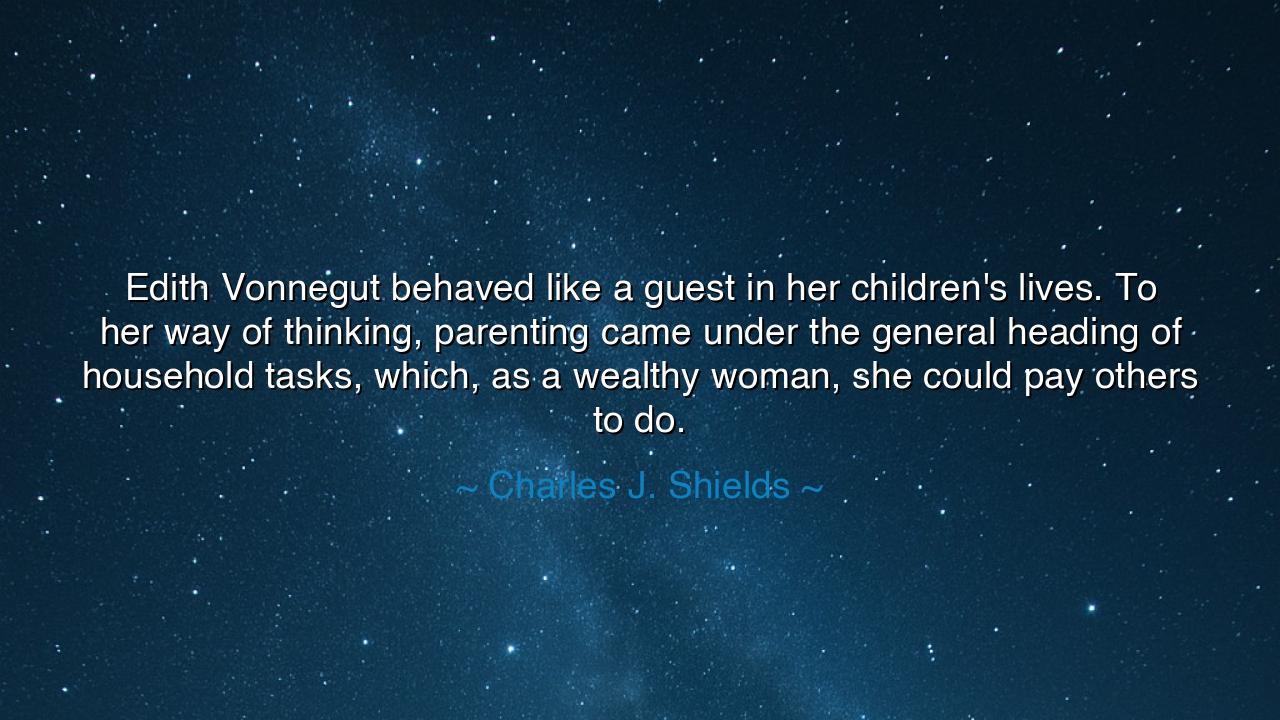
Edith Vonnegut behaved like a guest in her children's lives. To
Edith Vonnegut behaved like a guest in her children's lives. To her way of thinking, parenting came under the general heading of household tasks, which, as a wealthy woman, she could pay others to do.






In the chronicles of Charles J. Shields, there appears this piercing observation: “h Vonnegut behaved like a guest in her children’s lives. To her way of thinking, parenting came under the heading of household tasks, which, as a wealthy woman, she could pay others to do.” These words cut deep, for they reveal a truth both sorrowful and cautionary. To be a guest in the lives of one’s own children is not merely to fail in duty—it is to surrender the sacred bond entrusted by nature and time. The womb that bore becomes distant, the heart that should guide becomes absent, and the child grows not with a parent, but with shadows.
The ancients long warned against mistaking wealth for wisdom. The philosopher Seneca spoke of those who “possess much, yet own nothing of themselves.” h, shielded by comfort and gold, confused nurturing with a chore, and thus withdrew, handing her children over to strangers. But a mother is not a servant to be replaced, nor a father a task to be delegated. A parent is the first mirror of a child’s soul, the flame by which the young discover who they are. To withdraw from this role is to leave the child wandering in a house without a hearth.
History offers us both warnings and examples. Consider the tale of Nero, Emperor of Rome. Raised in the palace of luxury, with tutors and attendants aplenty, he lacked the tender presence of a mother who guided with love rather than ambition. His mother, Agrippina, saw him as a pawn for power, not as a son to cherish. And though Nero inherited riches, he inherited no compass of heart. His reign became a lesson in how the absence of true parenting breeds ruin, both for child and for nation. Contrast this with the story of Abraham Lincoln, who, though born in poverty, spoke of his stepmother as the “best friend I ever had.” She read to him, nurtured him, believed in him. In her humble care, greatness was sown.
Shields’s words remind us that to treat children as accessories of the household is to wound them silently. A child may eat well, dress finely, and live in splendid halls, yet starve of the one thing no wealth can purchase: presence. To a child, the simple act of a parent listening, watching, or walking beside them outweighs the grandest luxuries. For it is not servants who imprint the soul, but the tender, repeated presence of father and mother.
The lesson for us, therefore, is that love cannot be outsourced. We must beware of a world that tempts us with busyness, wealth, or distractions, whispering that we can purchase replacements for our time. The truth is eternal: children do not remember the gold we spent on them; they remember the hours we gave them. Let no parent become a guest in the lives they were called to shape. Let no child look back and recall only the presence of strangers where a parent should have been.
What then must we do? First, let us place our children not at the edges, but at the center of our daily lives. Speak with them, even when weary. Share with them, even when pressed for time. Second, let us treat parenting not as a task, but as a covenant, sacred and binding. It is not something to finish and set aside, but a lifelong weaving of souls. Third, let us learn from both the rich who abandoned their children and the poor who gave all they had, that true legacy is not built of coins, but of care.
O seekers of wisdom, remember this: the greatest poverty a child can suffer is not hunger of the body, but hunger of the heart. And the greatest wealth a parent can bestow is not found in treasures of silver or silk, but in the simple, steadfast gift of presence. If we would live well, let us not be guests in the lives of our children, but hosts who welcome them daily into the feast of love, guidance, and remembrance.
Thus, from the tale of h Vonnegut we take not condemnation, but a warning and a call. Be present. Be steadfast. Do not trade away the irreplaceable bond for the fleeting mirage of comfort. For the parent’s place is not at the threshold, passing in and out like a visitor, but at the hearth—ever burning, ever faithful, ever near.






AAdministratorAdministrator
Welcome, honored guests. Please leave a comment, we will respond soon